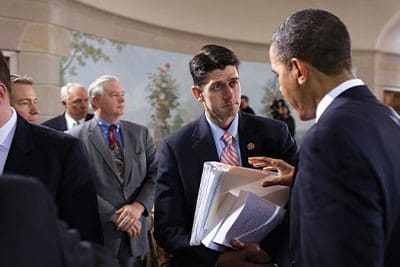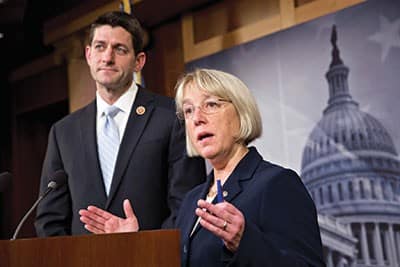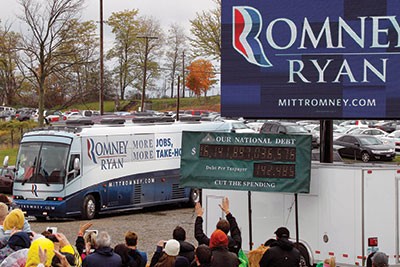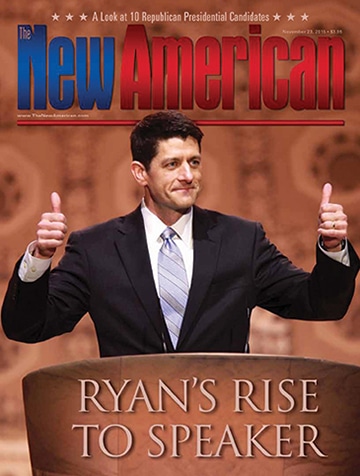Ryan’s Rise To Speaker
With the election of Wisconsin congressman Paul Ryan to speaker of the house, many Beltway insiders are publicly professing hope that the internecine conflict and gridlock of the Boehner years will be put aside. Ryan, we are now being told, is the face of legislative competence, a political prodigy who is one of Washington’s top policy experts and a proven dealmaker who can work with adversaries across the aisle. All of that is true, but is it what America needs? From his credentials and political history, Paul Ryan is a younger, more charismatic edition of John Boehner, favored by the Washington establishment for his ideological pliancy and willingness to continue the seemingly never-ending era of unrestrained government growth. Small wonder that Obama’s Deputy Press Secretary Eric Schultz recently told the press that Ryan was a man the president “can work with.”
Ryan’s Pedigree
Paul Ryan, a fifth-generation Wisconsinite, was probably born to be a politician. His father, an accomplished lawyer, worked in the same building as the father of another well-known Wisconsin politician, former Democratic senator Russ Feingold. The bright, affable Ryan experienced family tragedy in his teenage years when he discovered his father dead in his bed of a heart attack at age 55. Determined to excel, he saved his father’s Social Security benefits until he was 18 to pay for college. He enrolled in Miami of Ohio and majored in economics and political science, studying under libertarian professor Richard Hart. Hart introduced Ryan to the writings of free market economists such as Milton Friedman, Friedrich Hayek, and Ludwig von Mises, as well as the Objectivist philosophy and novels of Ayn Rand.
Ryan, not content with armchair theorizing, was politically active in college, becoming active in the College Republicans and volunteering for the campaign of a then little-known up-and-coming Ohio politician named John Boehner.

Bipartisanship: Paul Ryan discusses health insurance reform with President Obama in 2010. He and other Republicans do not disagree with Democrats on principle, but merely in degree. Both sides agree that the federal government should have a role in healthcare and healthcare insurance, even though it has no constitutional authority to do so.
Ryan graduated from Miami of Ohio in 1992 and, with the help of Professor Hart, received an internship to work in the D.C. office of Senator Bob Kasten (R-Wis.), where he specialized in foreign affairs. Unfortunately for Ryan, his boss was defeated by upstart Democrat Russ Feingold later that same year, and he ended up working as a speechwriter for Empower America, a neoconservative think tank founded by Bill Bennet, Jean Kirkpatrick, and Jack Kemp, all marquee names in the neoconservative movement of the ’80s and ’90s. Kemp in particular became a telling influence on Ryan’s political and philosophical development.
In 1998, back in Wisconsin, Ryan ran for office for the first time and was elected to the House of Representatives out of Wisconsin’s First District. It was not long before Ryan attracted the attention of Republican movers and shakers in the House and was pegged as a future leader. His Wisconsin constituents reelected him term after term by large majorities.
In 2007, Ryan, whose interest in fiscal policy is well documented, became the ranking member of the House Budget Committee and then chair of that committee in 2011. In January of 2015, Ryan became chair of the even more consequential House Ways and Means Committee — the committee tasked with all revenue-raising policy in the House, and thus the single most powerful committee in Washington, since it embodies the House’s constitutionally granted power over the purse strings.
It was his selection as Mitt Romney’s running mate in the 2012 elections that turned Paul Ryan into a household name. Because Ryan had already been pegged by many of his colleagues as a future speaker of the house and presidential candidate by the beginning of the Obama administration, Romney’s choice was no surprise to Washington insiders. Ryan had by 2012 gained a reputation as a compromiser and consensus builder — precisely the attributes valued by a Beltway establishment bent on maintaining the Big Government status quo. Ryan had voted in support of the Troubled Asset Relief Program (TARP), George W. Bush’s massive $700 billion bank bailout, as well as the auto industry bailout, both of which had the effect of ratcheting up the national debt without having a discernible impact on the economy as a whole. Both Bush bailouts were aimed at saving big banks and the Big Three automakers, but — like all corporate handouts — did nothing to improve the economy as a whole. Ryan also threw his support behind government-controlled healthcare, Republican-style, when he voted in 2003 in support of President Bush’s Medicare Modernization Act (MMA), the largest overhaul of Medicare in its history up to that point.
In other matters of fiscal policy, which have always been Ryan’s specialty, he has consistently stood for neocon alternatives, which typically involve modification rather than abolition of unconstitutional programs. Ryan has long been a proponent of the “privatization” (rather than abolition) of Social Security, for example, and also favors replacing Medicare with an equally unconstitutional voucher system.
He has also long been an outspoken proponent of line-item veto power for the president, which would allow the president the novel authority to veto only those portions of omnibus spending bills that he chooses. The line-item veto is in effect an extra-constitutional remedy for a problem created in the first place by government malfeasance, namely, the practice of creating massive “omnibus” spending bills running into thousands of pages, in which legislators can conceal all manner of pork. Omnibus bills are now beloved of both parties because they allow the Washington spending spree to continue without accountability. The line-item veto would give the president monarchical prerogative of having the final say in what spending is allowable, to “solve” a problem that Congress itself has created. It is worth noting that, if Washington’s spending were reduced from the thousands of line items now in practice to something closer to legitimate constitutional limits, the alleged need for a line-item veto to rein in the fiscal insanity would disappear.
On education, Ryan’s views have also mirrored those of the neocon faction. He voted for the No Child Left Behind Act of 2001, and has pushed for government vouchers for students attending private school.
The year after Obama won reelection, Ryan brokered the Bipartisan Budget Act of 2013, which he cosponsored along with Washington Democratic Senator Patty Murray, one of the most radical left-wing members of the entire legislature. Touted as a grand compromise, the Bipartisan Budget Act rolled back some of the restrictions imposed by the sequesters — restrictions that Republicans promised to reinstate according to the terms of the act, but which have subsequently been dropped in the memory hole. The act raised government spending in 2014 and 2015, in exchange for promises that spending would be cut thereafter, promises that have failed to materialize since the Big Government spenders got what they wanted. The bill was intended to lower the deficit by a projected $23 billion, a laughable amount given the fact that annual budget deficits are projected to average about $500 billion per year into the 2020s. Those are better than the trillion-plus dollar annual deficits logged during the depths of the Great Recession, but still amount to roughly half a trillion dollars per year added to the total federal debt (and those are the rosiest predictions, which very seldom come to pass where government spending is concerned). Although the bill’s sponsors claimed that it did not raise taxes, airline fees were raised significantly. No entitlement programs were touched in any way. In effect, the bill was a successful bid by Democrats to maintain the tax, borrow, and spend status quo, gutting the hated sequesters into the bargain, and it had Paul Ryan’s fingerprints all over it.
The Bipartisan Budget Act was roundly criticized by the partisans of liberty remaining in the House. Republican Raúl Labrador (R-Idaho), one of very few congressmen to have earned a 90 percent or higher cumulative Freedom Index score as tabulated by The New American, pointed out that “[the bill] makes promises to the American people that are false. Today the Democrats realized they were right all along, that we would never hold the line on the sequester.” Senators Rand Paul (R-Ky.) and Marco Rubio (R-Fla.) both opposed the bill, with Rubio calling it “irresponsible” and maintaining that the bill “cancels earlier spending reductions, instead of making some tough decisions about how to tackle our long-term fiscal challenges caused by runaway Washington spending.”

Selling out the public: Paul Ryan was largely responsible for brokering a budget compromise with ultra-liberal Democratic Senator Patty Murray, the Bipartisan Budget Act of 2013, which abandoned any pretense of Republican fiscal restraint, eliminating sequesters and promising future budget cuts that have yet to materialize. (Photo credit: AP Images)
For his part, Ryan defended the bill for allowing no new spending (false) while cutting the deficit (by a trivial amount). The passage of this grotesque cave to obstreperous Democrats is one of the major reasons that Speaker John Boehner is perceived by his colleagues as unwilling to hold to electoral promises to reduce the size of government and cut government spending. And the charismatic Ryan has been his more mediagenic sidekick through his entire tenure as speaker of the house.
Ryan’s “Path to Prosperity” budget proposals would extend the fiscal irresponsibility well into the next decade, with a balanced budget not being attained until at least 2023. Fatuous statistics envisage annual budget deficits for the latter half of this decade and into the next in the tens of billions of dollars — instead of the hundreds of billions that we are actually seeing — before finally melting away into a surplus of seven billion dollars in 2023. This, while government spending continues to rise vertiginously by almost two trillion dollars during that same period.
Paul Ryan has been a staunch supporter of Trade Promotion Authority (TPA; also known as “fast track authority”) for the president, including President Obama. By supporting the TPA, Congress has surrendered one of its most important constitutional prerogatives to the executive branch, the authority to give advice and consent to the president on all treaties. Under the terms of the TPA, the president retains his authority to negotiate trade deals (a kind of treaty), but Congress is not permitted to filibuster, amend, or otherwise modify them once the president presents them; they may only vote up or down on them in their entirety. It is a curious instance of cognitive dissonance that the same clique of accomodationist Republicans who urge compromise and discussion on us when it comes to the preparation, modification, and passage of omnibus spending bills insist that no such messy mechanisms apply to the passage of international trade legislation.
As for trade, Ryan has expressed support for Obama’s Trans-Pacific Partnership (TPP, known informally as ObamaTrade), yet another mammoth international trade protocol (like NAFTA) that promises to lower tariffs and open doors in exchange for significant sovereignty concessions of member nations. As the debate of passage of NAFTA two decades ago demonstrated, the neocon GOP establishment does not understand (or willfully conceals) the crucial difference between free trade and managed trade; the TPP, like NAFTA, is an instance of the latter, designed to impose yet more restrictions on the independence of sovereign nations such as the United States, and to prepare the way for more powerful organs of international government already being planned. This is why the TPP has been drawn up in strict secrecy, with even Senator Ron Wyden (D-Ore.), chair of the Senate Trade Subcommittee, being kept completely in the dark. Just as Europe’s Common Market has been transformed into the EU, so too can the TPP, promoted by establishment Democrats and Republicans alike, be expected to “evolve” into a regional government apparatus sooner or later.

Presidential aspirations: Paul Ryan became a household name when Mitt Romney chose him as his vice-presidential running mate in the GOP’s ill-conceived Republican presidential campaign of 2012. Ryan’s stock has continued to rise among fellow GOP insiders, propelling him to the highest office in the House and a possible presidential campaign of his own down the road. (Photo credit: AP Images)
On social issues Ryan, a family man and devout Catholic, enjoys a somewhat ambiguous reputation. Ryan is pro-life beyond any doubt, and has consistently fought against abortion on demand. Ryan also has opposed same-sex “marriage,” but his posture in recent years has become a little unclear. In his early legislative career, he favored a constitutional amendment banning same-sex marriage, and opposed adoption by same-sex couples. However, in 2007 he voted for the Employment Non-Discrimination Act, a grotesquely unconstitutional piece of legislation rejected by most of his fellow Republicans, which prohibited employers from practicing any kind of “discrimination” in hiring — including so-called sexual orientation. In 2013, with the presidential campaign safely in the rearview mirror, Ryan completely reversed his earlier position and came out in support of adoption by same-sex couples, also claiming that he had always supported “civil unions” between same-sex couples.
Doctored Up as Doctrinaire
Philosophically, Ryan — like most neocons and vaguely-defined “conservatives” — is prone to being “tossed to and fro, and carried about with every wind of doctrine,” exhibiting no ideological consistency other than allegiance to what is fashionable to the mainstream Right. In his early career, for example, Ryan was wont to profess his admiration for icons of libertarian thought such as Ludwig von Mises, Friedrich Hayek, and Ayn Rand — especially Rand. For all her quirks, Rand’s two best-known works, The Fountainhead and Atlas Shrugged, provided an eloquent defense of laissez-faire capitalism and limited government that, in their time, were welcome and widely read antidotes to the adulatory statism of the mid-20th century. As recently as 2005, in an address to the Atlas Society in honor of Ayn Rand, Ryan lavished praise on the late high priestess of Objectivism:
I grew up reading Ayn Rand and it taught me quite a bit about who I am and what my value systems are, and what my beliefs are. It’s inspired me so much that it’s required reading in my office for all my interns and my staff. We start with Atlas Shrugged. People tell me I need to start with The Fountainhead then go to Atlas Shrugged. There’s a big debate about that. We go to Fountainhead, but then we move on, and we require Mises and Hayek as well.... It’s so important that we go back to our roots to look at Ayn Rand’s vision, her writings, to see what our girding, under-grounding [sic] principles are. I always go back to, you know, Francisco d’Anconia’s speech … on money when I think about monetary policy. And then I go to the 64-page John Galt speech, you know, on the radio at the end, and go back to a lot of other things that she did, to try and make sure that I can check my premises so that I know that what I’m believing and doing and advancing are square with the key principles of individualism.
Yet a few years later, when Ryan found himself on the presidential ticket, he suddenly became embarrassed by his past views, and tried to cover up his former interest in Ayn Rand. Calling claims that he had ever been a devotee of Ayn Rand an “urban legend,” Ryan insisted that “I reject her philosophy. It’s an atheist philosophy. It reduces human interactions down to mere contracts and it is antithetical to my worldview. If somebody is going to try to paste a person’s view on epistemology to me, then give me Thomas Aquinas.... Don’t give me Ayn Rand.” The fact that Ryan had boasted publicly about making Rand required reading for his staffers speaks volumes about his credibility.
As for Paul Ryan’s own Freedom Index record, his cumulative score is a tepid 58 percent, little higher than that of the man he replaced as speaker. His initial score, in the 106th Congress, was 56 percent, but it has dropped as low as 46 percent (108th Congress), and most recently registered 50 percent (114th Congress). His lone respectable score, 89 percent, came during the 111th Congress (2009-2010), when House Republicans were an embattled minority alongside their outnumbered Senate colleagues during the first two years of the Obama presidency. Such numbers undermine the credibility of Paul Ryan when Republicans are actually in a position to force real change — times like right now.
Speaker of the House Ryan now expects the minority of true conservatives in the House — the valiant remnant of a couple dozen men and women who do more than pay lip service to the Constitution and limited government — to fall in line and stop opposing efforts of the Republican establishment to cut deals with the Democrats. Time will tell if Ryan’s charisma enables him to browbeat the Freedom Caucus into compliance, or whether the embattled minority of patriots in the House — such as Justin Amash, Thomas Massie, and Raúl Labrador — are able to hold the line.


